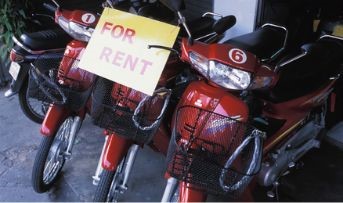General Insurance Blogs, Articles & Updates by - Magma HDI
Have us call you
- RENEW YOUR POLICY
- BUY NEW POLICY

With shared motorcycle services gaining popularity, run these checks before you ride one!
Motorcycles are a highly preferred mode of transport in India. While they are easily accessible, there continues to be a majority of the population that has second thoughts before buying them. Shared bike services have recognised the gap and mushroomed in response to market needs.
These short-term rental providers help reduce transport expenses in urban cities.
Despite their affordability, safety is a priority that cannot be compromised with these commute alternatives. Purchasing bike insurance online for your rented bike is a necessity to protect yourself from the cost of accidents. Additionally, running a comprehensive inspection can serve as an adequate preventive measure.
Here is a quick list of components to check before riding a rented bike.
1. Sound tyres
The most obvious component to inspect is the tyres. A safe ride needs to have well-maintained tyres and wheels. A glance will provide enough basis for the wear and tear of both elements. Multiple puncture signs, debris stuck in the ridges, deflated tubes, and worn tread depths are common concerns regarding tyres. For the inner wheel, closely evaluate the spokes' positioning to ensure safety.
2. Sturdy bike chassis
The general frame of the bike must be sturdy. A thorough check of all its essential functions will eventually give you an idea of the usage and condition of the motorcycle. Before leaving the facility with a bike, ensure you have tested its component adherence. A firm shake of the motorcycle will help make this clear. Rattling sounds are a sign of caution to look out for. The older the vehicle, the greater the sounds and the higher the risk of accidents.
3. Working brakes
Brakes are the safety net that can prevent accidents when coupled with riding expertise. A bike with failed brakes is a disaster waiting to happen that you must avoid. Ensure that you test the brakes with high priority. You must check the pressure required to engage the lever and the effective pace of braking. While bike owners often overlook it, bike renters must ensure that the front and rear brakes function flawlessly.
4. Check for any fluid leaks
Bikes do not appear as complex machines but are made of various parts. Many of these components require fluids that lubricate the inner bearings to ensure proper functioning. Some fluids essential for running your vehicle are fuel, clutch, radiator coolant, brake fluid, etc. While you may not know the exact location of each part, a quick check around the bike will expose any leaks. Also, check that these fluids are topped up to ensure optimal functioning.
5. Stands
An assumed to be non-integral part of a two-wheeler are its stands. Check the condition of both- the centre and side stand to ensure the bike is stable when parked. A proper chassis check will reveal any slack in the springs' tension or structural issues with the stands.
6. Indicators, horns, and lights
For a safe riding experience, giving clear indications while on the road is essential. By providing clarity, riders can communicate their intent clearly and prevent accidents. For ensuring smooth communication, the horn and indicators are critical. Test the functioning of indicators, horns, and lights.
Additionally, ensure that your signal reaches other riders. The head, tail, and brake lights deliver your indication. If you see any issues, notify the service provider immediately.
While shared bikes are extremely convenient modes of transport, riders and bike owners must inspect their two-wheelers properly before taking them for a ride. It is their responsibility to prioritise safety and derive value for their money. Additionally, riders and bike owners must consider purchasing bike insurance online to protect themselves against the financial cost of accidents.
Click HERE to buy bike insurance online.
Disclaimer: The information provided above is for illustrative purposes only. To get more details, please refer to policy wordings and prospectus before purchasing a policy.

Raising a claim for a scratch or a dent on your bike may not be the best move
In a country like India, where rash driving is very common, you must be extra careful about your actions on the road. You need to be familiar with all the traffic rules and regulations. It is because you endanger yourself, your co-passengers, and even the pedestrians on the road while driving. Following traffic rules saves you from unwanted damage and getting penalised. You should also have bike insurance to secure your motorcycle and finances in a crisis.
Although bike insurance is a good investment, what does it cover? Suppose you meet with a small accident. Is it okay to file a claim for minor dents or scratches? We will answer them all for you in this article.
Is it worth it to claim insurance for bike scratches and minor dents?
Bike insurance claims can be tricky. If you are new to the world of insurance, you will find it challenging to decipher everything. You may face difficulties filing a claim for something that is rightfully yours.
Before you file a claim, you must keep a few things in mind. The first is the extent of the damage done to your vehicle. The second is the type of policy that you have purchased. It determines the level of damage it covers.
With a comprehensive policy, you can file a claim for damages that occurred to your bike. However, if you have third-party insurance, the scenario will be different. In the case of third-party insurance, you will not get the cost for all the damages done to your bike as it covers the damages to a third party's vehicle.
So, for your comprehensive motor insurance policy, access the damage done to your bike and the extent of it. If you believe that the damages are beyond regular repair, you can file an insurance claim. However, you should not file the claim if you think the dents and scratches are repairable and will cost you nominal. In such a case, you must save the insurance claim for a future crisis. It is always better to be on the safer side!
What are the advantages of not claiming insurance for minor dents?
There are many hidden benefits of not claiming bike insurance for minor damages to your bike, including
● Low premium:
It is known that the premium will increase significantly when you claim insurance. It can be bothering for you to pay the increased premium after that. To avoid this, you should not claim minor damages as it will keep your finances in control, and you will enjoy a low premium.
● Lack of claim bonus:
The No Claim Bonus feature in bike insurance offers discounts to policyholders when renewing the policy for not filing a claim during the policy period. The discount increases for the years if you do not raise a claim.
Understanding the basics of bike insurance, such as coverage, inclusions, and future implications is a fundamental requirement before deciding to claim bike insurance. It is usually never worth claiming for minor dents as it can be less fruitful in the long run. Do your due diligence before making major financial decisions, such as purchasing bike insurance, raising claims, etc. Wisely utilise insurance benefits to ensure the best compensation for the damages incurred.
Click HERE to buy the best bike insurance in India.
Disclaimer: The information provided above is for illustrative purposes only. To get more details, please refer to policy wordings and prospectus before purchasing a policy.

Are you an off-road biking enthusiast? Consider purchasing these add-ons
Bikes are nothing short of an adventure on two wheels. While they have always been highly preferred in the Indian market due to their convenience, relative inexpensiveness, and ease of learning and riding, bikes are also doubling as a means of thrill providers over the last few decades.
With the varied topographical diversity in India, adrenalin seekers that enjoy motorbiking have found new joy in off-roading. While taking your bike on the road not commonly taken may give you momentary exhilaration, keeping your safety in mind before taking on such adventures is essential. Purchase a bike insurance policy that covers accidents resulting from such extreme sports.
Before getting started on your off-roading journey, consider purchasing these add-on covers to your bike insurance –
1. Engine protection:
The bike's engine is quite literally the heart of the machine. Ensuring it is in excellent condition is essential, especially when taking on challenging terrains. Since off-roading involves steep and rocky inclines, it puts tremendous pressure on your bike's engine. This makes it more likely to break down and leads to high engine repair costs. This add-on provides coverage for all expenses allied with engine repairs and maintenance.
2. Zero depreciation:
Wear and tear is a natural occurrence, and your bike is no exception. Usually, in case of raising a claim, the insurance company only admits a partial amount of the insured sum after factoring in the depreciation costs of the bike parts. However, buying a zero-depreciation cover can help you receive a higher claim amount than in the absence of such cover, making it easier to finance the cost of replacing bike components.
3. Theft of personal belongings:
Unlike regular riding, dirt biking requires special equipment that enhances the rider's safety. Such personal belongings are often expensive and require additional care to maintain. In case your riding gear gets stolen, a personal possessions cover can help you recover the insured sum or the cost of the stolen assets, providing peace of mind and financial security.
4. Roadside assistance:
Breakdowns may be frequent, even for regular bikes used for standard conveyance purposes on paved roads. Harsher terrains inevitably lead to greater chances of bike breakdowns due to multiple uncontrollable factors and mechanical failures. In such emergencies, it is necessary to have a backup plan to rely on. A roadside assistance cover provides reassurance of help in unforeseen conditions, making it a key requirement to purchase.
5. Outstation emergency cover:
The outstation emergency cover is necessary for off-road biking enthusiasts who enjoy long-distance biking adventures away from their residences. Generally, most bike insurance companies state the scope of coverage to be outside a 100-kilometre radius from the place of residence stated in the policy papers.
Can you buy specific bike insurance for your dirt biking adventures?
If you are a beginner to the sport, you may think of purchasing the above-stated add-on covers as a hassle and wonder why not buy an all-inclusive dirt biking insurance policy to protect your bike. Whether you intend to use a regular motorcycle for adventure sports or own a dirt bike, most insurance companies in India do not offer specific off-roading bike insurance. However, you may get comprehensive bike insurance that provides extensive coverage for your bike.
As the activity gains popularity, we expect the Indian insurance industry to adapt to the changing demand and provide suitable security cover for adventure activity. Until then, if you wish to take on the thrilling activity, we urge you to purchase the requisite add-on covers to make your bike insurance policy's coverage comprehensive for your needs.
Click HERE to buy bike insurance.
Disclaimer: The information provided above is for illustrative purposes only. To get more details, please refer to policy wordings and prospectus before purchasing a policy.

Here's how you can boost your brain power with the power of magnesium
Brain power is directly affected by several nutritional factors that enrich our body through the food we eat. Proper nutrition intake helps to boost our cognitive well-being. Our brain constitutes merely 2% of our body weight but consumes almost 20% of the overall energy utilisation. Hence, it is always searching for nutrition, and it becomes our duty to fulfill this need.
Is there any particular nutrient that can boost your brain power? You will be surprised to know that magnesium plays a significant role. Let us know more about it in detail.
*Note
It is crucial to invest in the best health insurance policy in India to avoid venting your pockets while dealing with treatments or medical emergencies.
1. Energy production
Magnesium produces unimpaired energy required by mitochondria, the powerhouse of cells. Magnesium also enhances the activities of the essential enzymes useful in energy production.
If energy production is not optimal, our brains may not function properly. There can be a negative impact on its cognitive powers. Hence, magnesium is essential in our body to facilitate energy production and boost our brain power.
2. Neuronal processes
Other than energy production, magnesium is important for neuronal processes too. It regulates neuro-transmitting signals in the brain. It is the key to the prime neurotransmitters- GABA and glutamate.
Magnesium also helps to maintain sufficient calcium content in the brain cells and regulates the activity of calcium channels. High magnesium levels in the brain can help enhance your memory and learning power. Also, it strengthens the process of synaptic plasticity, which can delay cognitive decline due to ageing.
An increase in magnesium levels in the brain may also increase the pace of neural stem cells production. It can promote neurogenesis in adulthood and improve the brain's adaptability to changing external environments, mood regulation, and cognitive flexibility. Magnesium can also help to maintain proper blood flow to your brain by helping to control oxidative stress and inflammation.
3. Brain decline
Various studies have proven that low magnesium levels can result in a decline in the brain's performance. People who have Alzheimer's disease come up with low levels of magnesium in their cerebrospinal fluid. Studies also show that people using magnesium oxide are less at risk of developing dementia.
Research also shows that magnesium plays a significant role in healing traumatic brain injuries. People treated with magnesium sulphate showed a favourable outcome and recovery within 12 hours. Studies have also proven that magnesium affects the functioning and health of a normal brain.
4. Magnesium-rich foods
Now you must be clear about the power of magnesium in boosting your brain power. But what are the foods that are rich in magnesium? Here's a complete list.
Dark chocolate, spinach, avocado, pumpkin seed, bananas, cashews, leafy green vegetables, whole grain, legumes, almonds, brown rice, black beans, yogurt, fish, and sunflower seed are some foods that are a rich source of magnesium.
Magnesium helps to boost your brain power and cognitive well-being. Increase your intake by consuming more food rich in magnesium. Magnesium is also important for several enzyme reactions impacting your bones, blood sugar, and nerves.
In addition to taking a magnesium-rich diet, you must buy the best health insurance policy in India that can protect you from unplanned financial burdens. Your health can deteriorate anytime, and you may require surgery. Health insurance will cover you in such instances. Do proper online and offline research and opt for the best health insurance policy in India that provides good coverage at the most reasonable premiums.
Click HERE to buy the best health insurance policy in India.
Disclaimer: The information provided above is for illustrative purposes only. To get more details, please refer to policy wordings and prospectus before purchasing a policy.

Can accidentally misfuelling your car be a potential threat
Motor insurance is a boon that provides vehicle owners security against the financial burden of mishaps that occur to their cars. While it offers several inclusions, acts classified as contributory negligence do not fall under the policy's scope of coverage.
One such act is misfuelling your vehicle, which unfortunately happens frequently. If you find yourself in such a situation, here's all you need to know.
Case 1: Potential dangers of petrol in a diesel car.
Gasoline in a diesel car is a solvent for low lubrication and could damage the fuel pump. Metal pieces from the broken pumps could cause more problems with the fuel delivery system.
What to do: Avoid turning the key and igniting the engine.
The tank must be emptied, with all tainted fuel removed and replaced with a new charge. You can only turn it on after that.
Case 2: Threats of diesel in a petrol car.
Because the diameter of the diesel fuel filler cannon is often larger than the slot of petrol cars, refuelling a petrol car with diesel fuel is uncommon. However, in such situations, the engine doesn't start, and the exhaust severely smokes while running.
The spark produced by spark plugs is what drives a petrol-powered car. Diesel can clog the candles and the fuel system when you fill it up and start the vehicle. It can lead to misfires, smoke, and possibly even a motor failure.
What to do: Don't turn on the ignition and refuel the tank.
Use a specialised additive that clears diesel traces from the fuel system if you fill the petrol tank with diesel in any amount. Furthermore, it matters how much diesel has dispersed throughout the car's internal components after entering the gasoline tank.
It is advised to do a complete tank drain and then fill the entire tank with gasoline. If less than 2 litres have been added, there will be no issues. Obtain assistance from a professional who can remove and clean the gasoline tank if the diesel content exceeds 5% of the tank capacity. Once completed, you can start the car and drive it further.
If your car is already running.
It is advised to drain the fuel tank and refill the fuel system with fresh gasoline before starting the car. If you're driving when you realise, stop as soon as possible. To eliminate the contaminated fuel, it is imperative to flush the tank. Replacement of the gasoline filter is essential in each scenario.
How can the risk be reduced?
No one purposefully fills their tank with the wrong fuel, yet many individuals do so even though the filler size varies for the two fuel types. The type of fuel used on each car is noted, typically on the tank cap and the filler cap as well. Before beginning to refuel, always double-check the type of fuel!
The repair cost may increase depending on how much-contaminated fuel is in the fuel system. You should always be careful to avoid such incidents, and if it does, you could incur significant repair costs.
One of your most valuable possessions, your car, needs to be protected because repairs are expensive. The best way to protect yourself is to purchase motor insurance, which offers several advantages that can increase your safety and safeguards your finances in the case of an accident.
Click HERE to buy motor insurance.
Disclaimer: The information provided above is for illustrative purposes only. To get more details, please refer to policy wordings and prospectus before purchasing a policy.

Ensure thrilling long rides without any aches by following these tips
Commuting by bike is a routine affair for millions of Indians around the length and breadth of the country. If you are a daily commuter and have to go through crowded, traffic-filled small lanes in India, a bike can be the best form of transportation.
Bikes can be great fun, even for long rides. However, the long journey can be tiring and cause body aches. Aches can spoil your remaining adventure and may dampen your high spirits about bike travel.
You can ensure thrilling long rides without any aches by following these tips.
1. Exercise
Long rides can cause severe backaches. Riding a bike puts extensive pressure on the core muscles because they bear your body weight. You need to strengthen your midsection and ensure that your spine stays strong. Several exercises strengthen your back, but you need to do them regularly, not just for a few days. There are some yoga asanas, too, that can help to strengthen your spine. Exercising will help preserve your core muscle strength and ensure your spine does not suffer undue pressure. It will benefit you immensely and prevent long-term health problems as well.
2. Correct posture
Incorrect posture while riding your bike can result in back pain, which even regular exercising cannot help. You should maintain a straight back during long bike rides. Line up your shoulders above your waist, and never sit in a hunching position. Most riders ignore their sitting posture and end up with back pain during long rides. Also, do not put extra weight on your back, such as a heavy backpack. Undue weight can also spoil your posture and cause back ache.
3. Rest occasionally
You must occasionally take a rest during a long ride on your bike. Continuously riding your bike without stopping can cause chronic injury. Stop frequently and get down from your bike. Try simple stretching exercises such as arching your back forward and backward, twisting your shoulders and arms, and leaning in front to touch the toes. It will relax your body and freshen your mind and spirit.
4. Give your hands a break too
The incorrect gripping style of the bike handle can result in hand aches. Your wrists should have about 10-15 degrees back-bend on the handle. Some bikes have very low handles, which can cause discomfort and pain, especially during long rides. You can always get your handle position adjusted by a mechanic if you feel it is too high or too low before commencing the long ride.
5. Good seat cushioning
Company-fitted bike seats may not have adequate cushioning. This can cause discomfort and backache during long bike rides. Get a good seat cover for your bike that has proper cushioning. You can get it customized and choose the cushioning level as per your choice and comfort.
Many bike enthusiasts love taking their bikes on long rides for a thrilling experience. Following the above tips will ensure that you truly enjoy your long ride without aches and discomfort during your journey.
A good 2 wheeler insurance policy is as critical for any rider as it ensures a comfortable long ride. It will provide you with financial coverage for an accident or damage. The insurance company will reimburse you for your bike’s current value if stolen. Moreover, having valid 2 wheeler insurance while riding your motorcycle is legally compulsory. So what are you waiting for? Go get your 2 wheeler insurance policy immediately!
Click HERE to buy a 2 wheeler insurance policy in just a few clicks.
Disclaimer: The information provided above is for illustrative purposes only. To get more details, please refer to policy wordings and prospectus before purchasing a policy.

Encountering these 3 situations warrants cancelling your bike insurance
Bike insurance is essential for every motorcycle owner to protect themselves from financial losses because of unfortunate events such as theft, damage, or accidents. Most people purchase bike insurance online as it saves time and offers them various options to compare and choose from. However, sometimes people encounter situations where they should consider cancelling their bike insurance to save unnecessary payments.
If you are selling your bike, moving abroad with your bike, or your bike is no longer in use, you can save unnecessary premiums just by cancelling your insurance policy.
By understanding these situations, bike owners can make informed decisions about cancelling their bike insurance policy when necessary. Without further ado, let's discuss these situations in detail.
1. Selling your bike
If you have sold your bike, you do not need to keep the insurance policy active. In such a scenario, you should cancel your bike insurance policy to avoid paying unnecessary premiums. You can easily cancel your bike insurance online by contacting your insurance provider.
2. Moving abroad
You must buy bike insurance in that country when moving abroad along with the bike. In such a situation, cancelling your existing bike insurance policy is advisable to save you from paying unnecessary premiums. Contact your insurance provider to cancel your policy, and they will guide you through the process.
3. The bike is no longer in use
You do not need to pay for bike insurance if your bike is no longer used. For instance, if you have switched to public transport or a car, you should cancel your bike insurance policy to save money.
The other probable reasons when you can cancel your bike insurance are;
● Not satisfied with the policy
If you are dissatisfied with your current bike insurance policy and have found a better one with more benefits and a lower premium, you can consider cancelling your existing policy. However, before cancelling, you should read the terms and conditions of your current policy to understand if there are any cancellation charges or penalties.
● High premium
If you are finding it difficult to pay the high premium of your bike insurance policy, consider cancelling it. However, before cancelling, you should compare policies from different insurance providers to find one that suits your budget.
● Reckless driving
Your insurance provider may cancel your policy if you have a history of reckless driving and have been involved in multiple accidents. In such a scenario, it is advisable to surrender your bike insurance policy and look for a new policy that suits your needs.
Bike insurance is a crucial aspect of bike ownership as it provides financial protection against any unforeseen events. However, there are certain situations where cancelling your bike insurance policy is the right decision. It is essential to remember that before cancelling your policy, you should read the terms and conditions of your policy to understand if there are any cancellation charges or penalties. By cancelling your bike insurance policy when necessary, you can save money and ensure you buy the right bike insurance online to fully meet your needs from the comfort of your home.
Click HERE to learn more about the benefits of purchasing bike insurance online.
Disclaimer: The information provided above is for illustrative purposes only. To get more details, please refer to policy wordings and prospectus before purchasing a policy.

Best beginner's tips for enjoying kayaking this summer holiday
Kayaking is one of the most exhilarating water sports activities one can indulge in during the summer holidays. It is an exciting way to explore the natural beauty of lakes, rivers, and oceans while exercising and enjoying the fresh air. However, for those who are new to the sport, it can be overwhelming to figure out where to start. Therefore, we have compiled a list of the best beginner tips to help you enjoy kayaking this summer holiday.
While kayaking is a fun and exciting activity, it also involves some risks, and it's essential to take precautions to ensure your safety. In addition to learning the basics of kayaking, it's necessary to understand the importance of wearing protective gear and obtaining a personal accident insurance policy before you hit the water.
With these factors in mind, let's understand some detailed pointers to help you make the most of your summer kayaking experience.
1. Choose the right type of kayak
Before you start kayaking, you must choose the right type of kayak for your skill level and the water you'll be kayaking on. Sit-on-top kayaks are an excellent option for beginners as they are stable and easy to use. They are also less likely to tip over, making them safer.
2. Wear appropriate clothing and gear
Kayaking can be a wet and messy experience, so wearing appropriate clothing and gear is essential. Wear a life jacket, a helmet, and appropriate footwear. Choose quick-drying, lightweight clothes that will keep you cool and comfortable in the water.
3. Learn the proper paddling technique
The paddling technique is essential for an enjoyable kayaking experience. Learn the proper technique from a qualified instructor or watch online tutorials. Good technique will help you conserve energy and prevent injuries.
4. Choose calm waters
Choosing calm waters with minimal currents and waves is essential for a beginner. Avoid kayaking in open water or rough conditions until you're confident in your abilities.
5. Bring a friend
Kayaking alone can be dangerous, especially for beginners. Bring a friend along for safety and to make the experience more enjoyable and memorable.
6. Stay hydrated
Kayaking can be physically demanding, and you can quickly dehydrate in the sun. Bring plenty of water or sports drinks to stay hydrated throughout your kayaking trip.
7. Check weather conditions
Before heading out for your kayaking trip, check the weather conditions. Avoid kayaking in stormy or high wind conditions, as these can make the water choppy and difficult to navigate.
8. Know your endurance
As a beginner, it's essential to know your limits and not push yourself too hard. Take frequent breaks, and don't overestimate your abilities. It's better to have a shorter, enjoyable kayaking trip than to push yourself too hard and have an awful experience.
9. Get a personal accident insurance policy
Consider getting a personal accident insurance policy before embarking on your kayaking adventure. This will protect you from any accidents or injuries during your kayaking trip. This policy can provide financial assistance for medical expenses and lost income due to injuries.
Kayaking can be incredibly fun and rewarding for anyone looking to enjoy the great outdoors this summer. By following the beginner's tips outlined above, you'll be able to get started with kayaking in no time while ensuring your safety and minimising the risks. Always prioritise your safety by wearing personal protective gear, obtaining a personal accident insurance policy to safeguard yourself against all the risks and dangers of the sport, and checking weather conditions before you hit the water. So, grab your paddle, wear your life jacket, and get ready to have fun on the water!
Click HERE to learn more about the benefits of purchasing a personal accident insurance policy.
Disclaimer: The information provided above is for illustrative purposes only. To get more details, please refer to policy wordings and prospectus before purchasing a policy.


